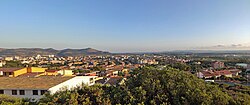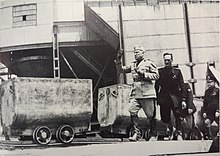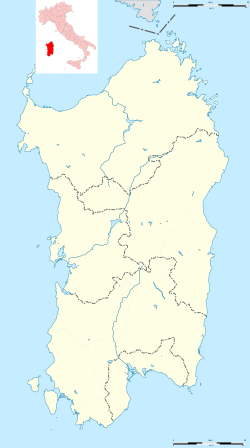Carbonia, Sardinia
Carbonia
Crabònia (Campidanese) | |
|---|---|
| Comune di Carbonia | |
 panorama | |
| Coordinates: 39°10′2″N 8°31′20″E / 39.16722°N 8.52222°E | |
| Country | Italy |
| Region | Sardinia |
| Province | South Sardinia |
| Frazioni | Bacu Abis, Barbusi, Cannas, Corongiu, Cortoghiana, Genna Corriga, Flumentepido, Is Gannaus, Is Meis, Medadeddu, Medau Desogus, Serbariu, Sirai, Sirri |
| Government | |
| • Mayor | Pietro Morittu (PD) |
| Area | |
• Total | 145.54 km2 (56.19 sq mi) |
| Elevation | 111 m (364 ft) |
| Population (31 December 2017)[1] | |
• Total | 28,265 |
| • Density | 190/km2 (500/sq mi) |
| Demonym | Carboniesi or Carboniensi |
| Time zone | UTC+1 (CET) |
| • Summer (DST) | UTC+2 (CEST) |
| Postal code | 09013 |
| Dialing code | 0781 |
| Patron saint | St. Pontian |
| Saint day | Third Thursday of May |
| Website | Official website |
This article needs additional citations for verification. (October 2022) |
Carbonia (Italian: [karˈbɔːnja] ⓘ; Campidanese: Crabònia [kɾaˈβɔɲa]) is a town and comune (municipality) in the Province of South Sardinia, Sardinia, Italy. Along with Iglesias it was a co-capital of the former province of Carbonia-Iglesias, now suppressed. It is located in the south-west of the island, at about an hour by car or train from the regional capital, Cagliari.
History
[edit]
Carbonia was founded on the 18 December 1938 by the Fascist regime. Benito Mussolini ordered the building of the city and was present at its inauguration. The city was built to provide housing for the workforce of the nearby mines. The name Carbonia comes from the Italian word for coal, abundant in the area.
Vitale Piga was appointed mayor of Carbonia and served in that capacity from September 28, 1939 to April 24, 1942.[2] Piga authored a book on the coalfields of the Sulcis region titled Il giacimento carbonifero del Sulcis: Carbonia.[3]
The city has grown since its founding in 1938 due to immigration from elsewhere on the island and from mainland Italy (in particular from the regions of Veneto, Sicily, Abruzzo, Marche, Basilicata and Campania),[4] reaching about 45,000 residents in 1951. Currently it has a population of over 28,000.
Since the closing of the mines in the 1970s, Carbonia has had a high unemployment rate. After the closure of the mines the town's economy was converted to the metallurgical industry. Today most Carbonians are employed in heavy industry, and in the tertiary sector.
Main sights
[edit]- Monte Sirai, a hill in the surroundings of the city that hosts the ruins of a Phoenician-Carthaginian built-up area
- Domus de janas in the surroundings of Sirri and Monte Crobu
- Romanesque church of Santa Maria di Flumentepido (11th century)
- Former Serbariu coal mine, now turned into a museum and a site of industrial archaeology
Climate
[edit]| Climate data for Carbonia (Bacu Abis) (1981–2010) | |||||||||||||
|---|---|---|---|---|---|---|---|---|---|---|---|---|---|
| Month | Jan | Feb | Mar | Apr | May | Jun | Jul | Aug | Sep | Oct | Nov | Dec | Year |
| Mean daily maximum °C (°F) | 13.9 (57.0) |
14.1 (57.4) |
17.0 (62.6) |
19.0 (66.2) |
23.8 (74.8) |
27.9 (82.2) |
30.7 (87.3) |
31.1 (88.0) |
27.5 (81.5) |
23.7 (74.7) |
18.5 (65.3) |
14.6 (58.3) |
21.8 (71.3) |
| Daily mean °C (°F) | 10.5 (50.9) |
10.4 (50.7) |
13.0 (55.4) |
14.7 (58.5) |
18.9 (66.0) |
22.6 (72.7) |
25.4 (77.7) |
25.9 (78.6) |
22.6 (72.7) |
19.3 (66.7) |
14.9 (58.8) |
11.3 (52.3) |
17.5 (63.4) |
| Mean daily minimum °C (°F) | 7.0 (44.6) |
6.7 (44.1) |
8.9 (48.0) |
10.3 (50.5) |
13.9 (57.0) |
17.3 (63.1) |
20.1 (68.2) |
20.6 (69.1) |
17.6 (63.7) |
14.8 (58.6) |
11.2 (52.2) |
7.9 (46.2) |
13.0 (55.4) |
| Average precipitation mm (inches) | 56.0 (2.20) |
58.3 (2.30) |
40.9 (1.61) |
56.0 (2.20) |
31.8 (1.25) |
16.7 (0.66) |
1.1 (0.04) |
7.2 (0.28) |
37.0 (1.46) |
68.2 (2.69) |
92.6 (3.65) |
82.2 (3.24) |
548 (21.58) |
| Source: Sistema nazionale protezione ambiente[5] | |||||||||||||
Government
[edit]International relations
[edit]Carbonia is twinned with:
 Oberhausen, Germany
Oberhausen, Germany Behren-lès-Forbach, France, since 2005
Behren-lès-Forbach, France, since 2005 Labin, Croatia, since 2010
Labin, Croatia, since 2010 Raša, Croatia, since 2010
Raša, Croatia, since 2010
Gallery
[edit]-
Piazza Roma
-
Church of St. Pontian
-
Serbariu mine
References
[edit]- ^ Population data from Istat
- ^ "Carbonia ieri sera ha ricordato Vitale Piga, podestà della città dal 28 settembre 1939 al 24 aprile 1942". La Provincia del Sulcis Iglesiente (in Italian). 11 November 2017. Retrieved 2020-01-26.
- ^ Piga, Vitale (1938). Il giacimento carbonifero del Sulcis: Carbonia (in Italian). Confederazione Fascista Dei Lavoratori Dell'industria.
- ^ Stefano Musso (1999). Tra fabbrica e società - Mondi operai nell'Italia del Novecento. Feltrinelli. p. 321. ISBN 88-07-99054-7.
- ^ "Climatology of Sardinia for the thirty-year period 1981-2010". Sistema nazionale protezione ambiente. Retrieved 27 November 2024.
External links
[edit]







